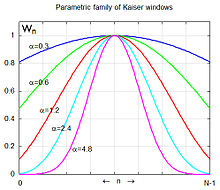凱澤窗
凱澤窗(Kaiser window)是由貝爾實驗室的James Kaiser所提出的。凱澤窗是一個單參數的窗函數群,用在數碼訊號處理中,其定義如下[1][2]:

其中:
- N 為序列的長度
- I0 是零階的第一類修正貝索函數
- α 是任意非負實數,用來調整凱澤窗的外形。在頻域上可以在主瓣(main-lobe)寬度及旁瓣(side lobe)大小中取拾,這是窗函數設計的重要考量因素。
若N為奇數,窗函數最大值會在 。若N為偶數,窗函數最大值會在 。
傅立葉變換
編輯若將上述離散數列視為是連續函數,並進行傅立葉變換:
w0(t)的最大值為w0(0) = 1. 上述的w[n]數列為以下函收的取様:
- ,在間隔T的時間進行取樣。
而且rect()為矩形函數. W0(f)主瓣後的第一個零點在:
調整α可以在主瓣的寬度及旁瓣大小中進行取捨。若α增加,W0(f)主瓣的寬度增加,而旁瓣的大小減小,如右圖所示。α = 0會對應長方形的窗函數。若α增加,時域及頻率下凱澤窗的形狀都會接近高斯曲線。凱澤窗在頻率0附近的集中程度是幾乎最佳化的(Oppenheim et al., 1999)。
腳註
編輯- ^ Harris, Fredric j. On the use of Windows for Harmonic Analysis with the Discrete Fourier Transform (PDF). Proceedings of the IEEE. Jan 1978, 66 (1): 73–74 [2017-01-29]. doi:10.1109/PROC.1978.10837. (原始內容存檔 (PDF)於2017-03-19). Article on FFT windows which introduced many of the key metrics used to compare windows.
- ^ Kaiser, James F.; Ronald W. Schafer. On the Use of the I0-Sinh Window for Spectrum Analysis. IEEE Transactions on Acoustics, Speech and Signal Processing. February 1980,. ASSP-28 (1): 105–107.
- ^ Kaiser, James F.; Schafer, Ronald W. On the use of the I0-sinh window for spectrum analysis. IEEE Transactions on Acoustics, Speech, and Signal Processing. 1980, 28: 105–107. doi:10.1109/TASSP.1980.1163349.
參考資料
編輯- Oppenheim, A. V.; Schafer, R. W.; Buck J. R. Discrete-time signal processing. Upper Saddle River, N.J.: Prentice Hall. 1999. ISBN 0-13-754920-2.
- Kaiser, J. F. (1966). Digital Filters. In Kuo, F. F. and Kaiser, J. F. (Eds.), System Analysis by Digital Computer, chap. 7. New York, Wiley.
- Craig Sapp, Kaiser-Bessel Derived Window Examples and C-language Implementation, Music 422 / EE 367C: Perceptual Audio Coding (Stanford University course page, 2001).
![{\displaystyle w[n]=\left\{{\begin{matrix}{\frac {I_{0}\left(\pi \alpha {\sqrt {1-\left({\frac {2n}{N-1}}-1\right)^{2}}}\right)}{I_{0}(\pi \alpha )}},&0\leq n\leq N-1\\\\0&{\mbox{otherwise}},\\\end{matrix}}\right.}](https://wikimedia.org/api/rest_v1/media/math/render/svg/a81b40939275883d17aec37311fa6417bac74d7f)
![{\displaystyle \scriptstyle w[(N-1)/2]=1,}](https://wikimedia.org/api/rest_v1/media/math/render/svg/cd9d2b63c9d36d6abe8019c816e3d8c05ef31284)
![{\displaystyle \scriptstyle w[N/2-1]\ =\ w[N/2]\ <\ 1.}](https://wikimedia.org/api/rest_v1/media/math/render/svg/7835fbb025165c645caa9504efdd368392964bcd)